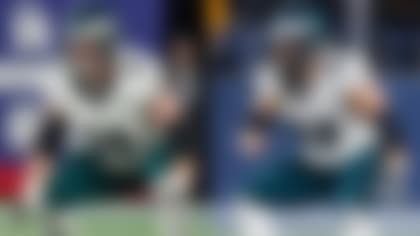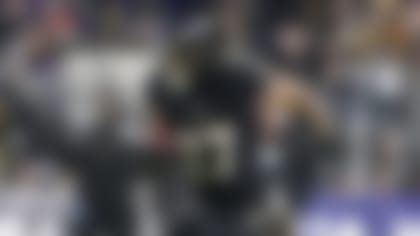FOXBOROUGH, Mass. -- This had the feeling of something more pronounced than the loss of a single playoff game. After a while, your senses told you that you weren't watching football so much as attending a funeral.
You knew, sooner or later, that this day was going to come. Through various parts of the past four months, the New England Patriots weren't functioning with the consistent excellence that once defined them. They seemed to be something that they hadn't been in a very long time.
Suddenly, the sort of words that accurately described what the Patriots had become were horrendous ... awful ... non-competitive.
Three Super Bowl victories in four years? Four Super Bowl appearances in seven seasons? 16-0? Twenty-two consecutive regular-season wins? One of the greatest quarterbacks in NFL history? One of the smartest coaches to ever prowl a sideline?
Clearly, none of that mattered to a significant portion of the 68,756 brave souls who occupied seats for Sunday's wild-card game at Gillette Stadium. Before the end of the first quarter, they would serenade the quarterback, the coach, and everyone else who would have a role in a 33-14 loss to the Baltimore Ravens with multiple choruses of boos.
After greeting the Ravens' 14-0 lead in the game's first 4:31 with mostly stunned silence, the crowd began letting the home team feel its wrath. The tipping point was Brady's first interception of the day, which set up Baltimore's third touchdown.
After Brady's second interception, which set up a field goal to give the Ravens a 24-0 advantage with 1:19 remaining in the first quarter, the booing became louder. Then, after a pathetic Brady screen pass to Kevin Faulk lost five yards on second-and-15 as the quarter came to a close, the crowd made its disgust known in no uncertain terms.
"I'd have been booing us, too," Brady said.
But this wasn't the sort of thing that could be dismissed with a self-deprecating one-liner. The booing hurt, and other players, such as Faulk and nose tackle Vince Wilfork, acknowledged as much. Wilfork said he felt as if he were playing on the road.
Still, the fans had it right. There was a palpable sense that the day wasn't going to get any better for the Patriots, and that feeling didn't just exist in the stands or the press box.
"Never had a chance from the first play to the last play," Wilfork said. "They came in and they wanted it more than us. What can you do about it?"
If you're the Patriots that have been the NFL's gold standard of the decade, you're not supposed to surrender so quickly or easily. You're supposed to be able to come roaring back. You're supposed to find a spark -- something, anything.
You're supposed to be too good to look this bad.
But these aren't the gold-standard Patriots anymore. Not after missing the playoffs in 2008 and going one-and-done a year later. When this team comes up against an elite opponent such as the New Orleans Saints, it doesn't have any answers. Now, when it enters the playoffs as a third seed up against the sixth seed -- a team to which it has never lost and in a stadium where it always wins in the postseason -- it has even fewer answers.
The Patriots weren't just careless with the ball Sunday; they showed no ability to stop the run. They couldn't cover kicks. They couldn't make field goals.
"They outcoached us, they outplayed us, they did everything better than we did," Bill Belichick said.
He said it the way he says a lot of things: Matter-of-factly. Belichick said he wasn't shocked by the way the game began or ended, leading to the assumption (because he never said so specifically) that he saw this coming just as the rest of us did.
When the Patriots struggled early in the year, it was widely dismissed as resulting from Brady shaking off the cobwebs of missing most of the '08 season because of a serious knee injury and from the aftermath of trading defensive end Richard Seymour to Oakland right before the first game of 2009. When they showed improvement, the prevailing theory was that Brady was regaining his dominant form of 2007 and he was seen as a legitimate candidate for NFL MVP, as well as Comeback Player of the Year (which he would win).
But when they demonstrated an inability to win on the road and Brady started to lose his sharpness, reports surfaced about his playing with broken ribs and a damaged index finger on his throwing hand.
Belichick shot down the reports. Brady played coy with the media, hinting there might be some truth there, but not wanting to sound as if he were making any excuses. That was his stance after the wild-card game, but if Brady ever could have used an explanation for a very un-Brady like day, this was the time.
Brady also refused to play the "Wes Welker card." Naturally, the Patriots offense missed the NFL's leader in receptions and their runaway MVP for 2009. Had he not suffered a season-ending knee injury a week ago, perhaps he would have provided the spark or two that the Patriots were missing.
Putting Patriots' defeat in perspective
» This was the Patriots' first home playoff loss since a 1978 divisional playoff game against the Houston Oilers.
» The 19-point loss was the Patriots' largest margin of defeat in the playoffs since losing 46-10 to the Chicago Bears in Super Bowl XX, and the worst home playoff loss in franchise history.
» This was the worst margin of defeat in the playoffs for the Patriots under Belichick. The previous worst was a 27-13 defeat against the Denver Broncos in the 2005 divisional playoffs.
But given how poorly they played in other areas, it didn't seem likely.
A loss like this makes one wonder exactly where the Patriots are headed. Wilfork, their best defensive player, is a free agent. Could he follow Seymour out the door?
What about Belichick? There have been rumblings that he and Pats owner Robert Kraft haven't exactly been on the greatest of terms since the whole "Spygate" mess of '07. There was even some speculation that Belichick was prepared to leave the Patriots at the end of that season and the only reason he chose to stick around was the fact the team fell short of perfection by losing to the New York Giants in the Super Bowl.
If fan interest is any gauge, there could be some troubled times ahead for the Patriots. They struggled to sell tickets for a wild-card game, as many fans generally saw no point in investing in what ultimately would be a lost cause, with a Patriots' victory sending them to San Diego in the divisional round. There were plenty of empty seats, a rarity for any game, let alone a playoff contest, at Gillette Stadium.
After Willis McGahee ran for a touchdown to make it 33-14 with 10:32 left, a mass exodus began. If this was, indeed, the end of a dynasty, there was nothing sentimental about its departure. This crowd showed no desire to offer any special thanks for all of the great achievements of the past.
When someone asked Brady to identify the Patriots' biggest problem this season, he said, "I don't think there is one sweeping statement. We had a lot of problems over the course of the year. Consistency in practice, consistency in games -- those were all something we were looking for, something we talked about and (were) a point of emphasis for our coach. Overcoming adversities and overcoming injuries or calls or bad bounces, I mean, that's just the way football is. I'd say, at times we did it, and at other times, we didn't."
Not exactly the description of a dynasty.




